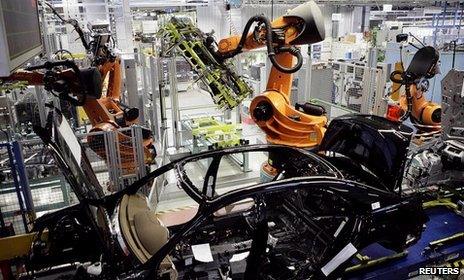Viewpoint: UK economic future 'depends on engineers'
- Published

Nasa's Kepler space telescope incorporated British-made detectors
Lord Browne of Madingley is a former chief executive of BP who chairs the Queen Elizabeth Prize for Engineering Foundation. Here, he explains the reasons for setting up the £1m prize and why re-vitalising engineering is key to getting the UK economy back on its feet.
This is not yet another article saying that engineering in the UK is "in crisis".
That term has been so chronically overused in the last twelve months - to describe the economy, individual banks, various members of the Euro and certain politicians - that it has virtually lost its meaning.
In fact, the numbers of young people deciding to study engineering and technology in the UK has at last slowly started to climb.
But they still account for only around 6% of the entire student population.
There is clearly something wrong when engineering companies in the UK are struggling to fill job vacancies at a time when more than a million young people are out of work.
Contrast this with the scene in India and China, which produce half a million engineers between them, every year.
Economically, the importance of engineering cannot be overstated. In 2009, UK industry contributed 21% of the country's GDP, but that figure has declined from 34% in 1990, according to UNCTAD statistics.
Most other developed economies have experienced a similar contraction of their industrial sectors, but even so we are well behind the developed economy average of 24%. And the trend is still heading down.
Compare that with the emerging economies and you see our challenge. India derives 28% of its GDP from industry and China a thumping 48% and the trend in both countries is sharply up.
That is why, today, I am calling for up to 2 million engineers to be produced for the UK economy to help cure the often discussed weakness of the UK in turning world class ideas into global commercial successes.
Competitive edge
The UK economy needs engineering in order to remain competitive in an increasingly global economy.

Lord Browne says an industrial strategy can set the UK back on the path to economic growth
The UK has a world class knowledge base and we hope that the Queen Elizabeth Prize for Engineering will re-invigorate interest and passion in engineering that will make the most of what we already have and build on it.
This country needs an industrial strategy to set it back on the path to economic growth by capitalising on our greatest strength: innovation. We, the engineering profession, with the support of government, must enthuse and excite our young people to join us in reengineering the economy.
Working together we must encourage schools to present engineering as an aspirational career. We must give students a financial reason to choose engineering at university - that means more scholarships, more fast-track courses and guaranteed work placements.
Today we're taking the first step along that road. We're inviting nominations for a new kind of international engineering prize - one that will consider achievements in all areas from fashion to fusion and from telescopes to televisions.
The aim of the Queen Elizabeth Prize is two-fold. It will celebrate the world's greatest modern engineering achievements, bestowing £1 million on the overall winner while proving to young people just how diverse, how creative, how relevant and important engineering really is.
This is not simply a prize. This is a recognition of everything that engineering is and everything that engineering can and will become. In this task, we must not fail - the economic future of the UK depends upon it.

- Published28 February 2012
- Published18 November 2011
- Published17 November 2011